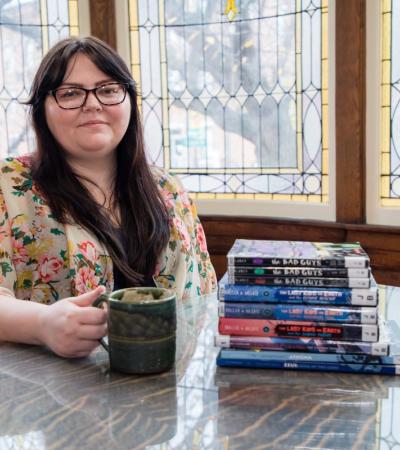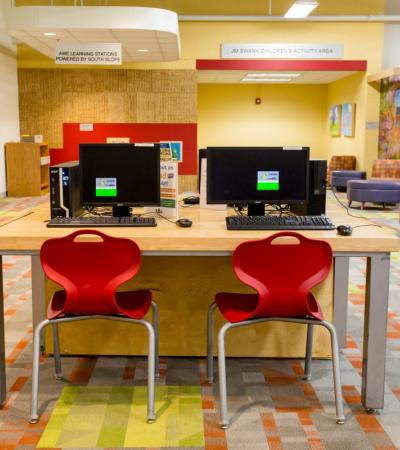When people think about programming in libraries, traditional programs — like story times for kids or a knitting club — may come to mind.

Although these classic programs are important, many libraries are constantly changing their programming in response to the specific needs of their communities. With support from ALA's Libraries Transforming Communities: Focus on Small and Rural Libraries initiative, some libraries are building on their existing programs to provide more targeted support for their patrons. This article highlights the efforts of two libraries that switched up their programs to make a bigger difference for the people they serve.
Reframing food insecurity head-on
Sometimes in the middle of running a program, library staff identify new needs in their communities that may not be addressed by what the library currently offers. But that doesn’t stop libraries from doing what they can to help. That's exactly what happened to Paul Addis, a reference librarian at Coos Bay Public Library in Oregon, who found a way to help people in the library’s service area have access to better resources on nutrition and healthy eating.
Other than books on food and nutrition, most people don’t expect to find cooking classes, much less opportunities to engage in conversations around food security, in libraries. As a reference librarian, Addis works on different types of adult programming. In the last few years, the library added programs focused on food literacy. One of these programs is Community Cooking with the Co-op, a monthly Zoom show where a staff member from a local food co-op teaches participants how to prepare healthy meals. But Addis wanted to do more. “I still felt like I wasn’t taking it to the next level,” he said.
There is often a direct link between nutrition and people’s health outcomes. Much of Coos County’s population is older and has higher rates of chronic conditions as well as greater mortality from cancer and heart disease. Coos Bay Library had resources that could help patrons learn how to eat better, and Addis was determined to get them through the door to talk about it.
The first step was changing up the library’s language for talking about its food programming. “I heard some librarians talking about setting up the conversations to make people as comfortable as possible. And I was like, wait, I need to back up and change my terminology,” Addis said. "After taking the LTC Basic Facilitation Skills e-Course, I decided to take food insecurity out of my public-facing materials. I didn't want anybody to come in with a negative label.” Addis wanted to be sure that people didn’t stay away because they could not afford the food. The library already had a number of partnerships with community organizations for its nutrition programming. In addition to the Co-op, the library had partnerships with local grocery stores and a health clinic. These partnerships enabled the library to provide vouchers to people in the community that covered the costs of ingredients for the cooking classes and share information resources on food and nutrition.
Throughout this project, Addis has developed a much stronger bond with the people in his community and forged meaningful partnerships with local businesses. This kind of community engagement is something that libraries like Coos Bay are known for. “To engage with these community members I already knew on a more personal level was really awesome. Just to get to know my community better,” he said. “That was probably the best thing about the LTC grant.”
Creating space for conversations about race
Library programming can be focused on informal education and sharing information. It can also be about helping communities heal. That’s what the staff at Tipp City Public Library, which serves Tipp City, Ohio, as well as nearby Bethel Township, are trying to do.
In recent years, the Tipp City Public Library has prioritized community engagement and partnered with local organizations to host events. Since 2019, the library has hosted a talk for high school students and the community given by an award winner for the Dayton Literary Peace Prize. Drew Wichterman, assistant library director and adult services librarian, saw an opportunity to use the program to spark challenging conversations around the topic of race. Through these conversations, he wants to help his community grapple with some of the negative aspects of their town’s history and ongoing challenges with racism.
To help prime the community for the conversations, “Homegoing” by Yaa Gyasi — the runner-up for the 2017 Dayton Literary Peace Prize in Fiction — was selected as the theme for the 2021 event.
The library then organized four conversations for its community — three virtual and one in-person — that focused on themes from the book. Going into the event and conversations, Wichterman expected some resistance from the community. “Many individuals want [race relations] to change here in Tipp. But there are still several [residents] that don't want to see it as an issue,” he said. There was some pushback from the community. Several people expressed opposition to the community conversations, and most declined to attend even when given the opportunity to air their views. Wichterman mentioned a library patron who responded to an online announcement of Gyasi’s visit with “a comment along the lines of ‘Do we really want this person in Tipp?’”
In response, people chimed in online expressing their support for Gyasi’s visit, and overall responses to the library’s efforts were very positive. About 50 people logged in to the three virtual events. Participants had a chance to interact with the author and other experts from a nearby university and ask them questions. Members from the community shared powerful stories about how the book had helped them think about themselves in different ways and had helped educate them about racial issues in the US.
For Wichterman, these conversations need to continue. He specifically noted the impact of the conversations on high school students. Tipp City is a predominantly white community. “The overwhelming understanding of many of the white students is that they don't consider themselves to be privileged just because of the color of their skin,” Wichterman explains, and learning about how others’ experiences differ from theirs was eye-opening for them.
His library hopes to expand this program to nearby libraries. “We are looking at expanding to all of the libraries in Miami County, and all of the libraries in Champaign County, which we already work with, and then possibly another library or two and school or two in surrounding areas, depending on who's available or interested,” he said. “We're already having those conversations.”
Knology is a nonprofit research organization that produces practical social science for a better world. The organization pursues this goal to help professionals in a variety of sectors build inclusive, informed, and cooperative societies that can thrive together with the natural systems on which we all depend. As a transdisciplinary collective of over 30 social scientists, writers, and educators, the organization's work process is built on equity, transparency, and deliberation.



